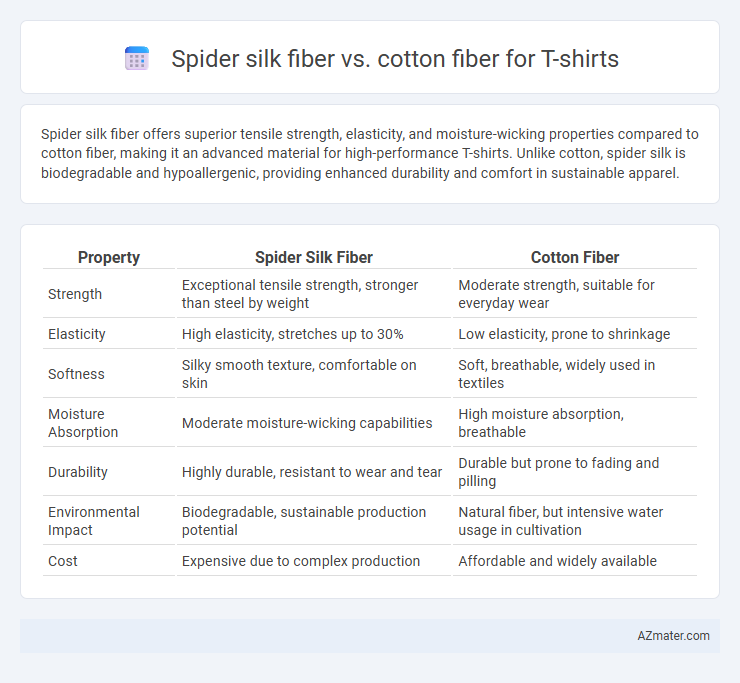Spider silk fiber offers superior tensile strength, elasticity, and moisture-wicking properties compared to cotton fiber, making it an advanced material for high-performance T-shirts. Unlike cotton, spider silk is biodegradable and hypoallergenic, providing enhanced durability and comfort in sustainable apparel.
Table of Comparison
| Property | Spider Silk Fiber | Cotton Fiber |
|---|---|---|
| Strength | Exceptional tensile strength, stronger than steel by weight | Moderate strength, suitable for everyday wear |
| Elasticity | High elasticity, stretches up to 30% | Low elasticity, prone to shrinkage |
| Softness | Silky smooth texture, comfortable on skin | Soft, breathable, widely used in textiles |
| Moisture Absorption | Moderate moisture-wicking capabilities | High moisture absorption, breathable |
| Durability | Highly durable, resistant to wear and tear | Durable but prone to fading and pilling |
| Environmental Impact | Biodegradable, sustainable production potential | Natural fiber, but intensive water usage in cultivation |
| Cost | Expensive due to complex production | Affordable and widely available |
Introduction: Unveiling the Future of T-shirt Fibers
Spider silk fiber offers unparalleled strength and elasticity compared to conventional cotton fiber, making it a revolutionary material for T-shirt manufacturing. This protein-based fiber boasts superior breathability, moisture-wicking properties, and biodegradability, setting new standards for sustainable and high-performance apparel. The integration of spider silk fiber in T-shirts promises enhanced comfort, durability, and eco-friendly advantages that outmatch the traditional cotton fiber widely used today.
Origin and Production: Spider Silk vs Cotton
Spider silk fiber originates from the protein secretion of certain spider species, harvested through a delicate and low-yield process, making it rare and expensive compared to cotton. Cotton fiber is derived from the seed hairs of the cotton plant, cultivated extensively worldwide with high yield and established agricultural infrastructure. The production of cotton fibers involves mechanical ginning and spinning, while spider silk requires advanced bioengineering or manual extraction methods, significantly impacting scalability and cost.
Mechanical Strength and Durability Comparison
Spider silk fiber exhibits tensile strength up to 1.3 GPa, significantly surpassing cotton fibers, which generally have tensile strength around 300-600 MPa. The superior molecular structure of spider silk enhances its elasticity and resistance to wear, making it considerably more durable under mechanical stress compared to cotton. Cotton fiber, while breathable and soft, shows faster degradation and lower abrasion resistance, reducing its lifespan in high-stress applications like activewear.
Comfort and Softness: Which Fiber Feels Better?
Spider silk fiber offers superior softness and a smooth, luxurious feel compared to cotton fiber, making it exceptionally comfortable for T-shirt wear. Its natural elasticity and lightweight structure enhance breathability and moisture-wicking properties, maintaining comfort throughout the day. Cotton fiber, while breathable and soft, tends to lack the same level of smoothness and resilience, often resulting in a coarser texture and less consistent comfort.
Moisture Management and Breathability
Spider silk fiber offers superior moisture management and breathability compared to cotton fiber, as its protein structure allows efficient moisture wicking and rapid drying. Cotton fiber tends to absorb and retain moisture, leading to longer drying times and potential discomfort during prolonged wear. The microstructure of spider silk enhances airflow and temperature regulation, making it ideal for performance T-shirts requiring advanced sweat control and comfort.
Environmental Impact and Sustainability
Spider silk fiber offers a remarkable environmental advantage over cotton fiber for T-shirts due to its biodegradability, lower water consumption, and minimal pesticide use during production. Cotton cultivation demands extensive water resources and often involves chemical fertilizers and pesticides, contributing to soil degradation and water pollution. Spider silk's renewable production methods, such as bioengineering, promote sustainable textile manufacturing with a significantly reduced ecological footprint.
Allergenic Properties and Skin Friendliness
Spider silk fiber exhibits remarkable hypoallergenic properties, making it ideal for sensitive skin and reducing the risk of irritation commonly associated with cotton fibers. Cotton fiber, while breathable and soft, can sometimes trigger allergic reactions due to residual pesticides or chemical treatments used during processing. The superior biocompatibility and natural antimicrobial characteristics of spider silk enhance its skin friendliness, providing comfort and protection for individuals with allergy-prone skin.
Color Retention and Dyeability
Spider silk fiber exhibits superior color retention compared to cotton fiber due to its unique protein structure, which allows dyes to bond more effectively and resist fading over time. Cotton fiber, while highly absorbent and dye-friendly, tends to lose vibrancy after repeated washes, resulting in diminished color intensity. The enhanced dyeability and long-lasting pigmentation of spider silk make it an excellent choice for T-shirts requiring lasting, vibrant colors.
Cost and Commercial Viability
Spider silk fiber offers superior strength and elasticity compared to cotton fiber but faces significant challenges in cost and commercial viability due to complex production processes and low yields. Cotton fiber remains economically favorable for T-shirts because of its widespread cultivation, established supply chains, and lower production costs. Despite spider silk's advanced properties, the high price and scalability issues limit its current use primarily to niche markets rather than mainstream apparel.
The Future of T-shirt Fabrics: Trends and Innovations
Spider silk fiber offers exceptional tensile strength and biodegradability, making it a promising sustainable alternative to traditional cotton fiber in T-shirt manufacturing. Unlike cotton, spider silk is naturally elastic, moisture-wicking, and hypoallergenic, enhancing comfort and durability while reducing environmental impact. Innovations in bioengineering and synthetic spider silk production are accelerating its commercial viability, signaling a transformative shift in future T-shirt fabric trends.

Infographic: Spider silk fiber vs Cotton fiber for T-shirt
 azmater.com
azmater.com